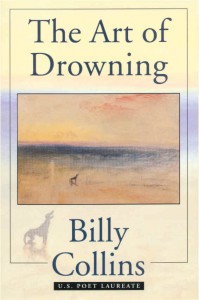 I always keep a poet by my bed.
I always keep a poet by my bed.
Lately it has been Billy Collins, former U.S Poet Laureate.
I don’t open the book every night. Only when I need to touch the play of language, to be entertained by poetry’s taut twists and turns and surprises, before settling into whatever novel I’m reading that will engage me for a half hour or so, then lull me to sleep.
But why Billy Collins? Why for months now has he kept me reaching for his poems?
Of course, there are the double-over-with-laughter poems like “Litany,” which he reads aloud in a deadpan voice that heightens the comedy.
In fact, deadpan is the characteristic voice of Collins’s poetry, a voice that allows him to create fanciful lists, caress details, or slip into a profound understatement, all without ruffling the surface tone of the verse. Humor is his home, and much of the humor is self-effacing. That’s surely part of what draws me to his work.
I’m drawn, too, because each poem is a small drama. It’s a quiet, often tongue-in-cheek drama, developing in a build-up throughout a poem—until a final twist or a rug-pulled-out-from-under at the end.
And this is precisely why I can’t quote single lines or even stanzas to illustrate what I’m talking about. So how can I persuade you of Collins’s unique attraction? Only by quoting an entire poem. I’m aware that no single poem can encapsulate all that Collins does in his poetry.
But here’s a start: “The Art of Drowning,” from the collection of that title.
I wonder how it all got started, this business
about seeing your life flash before your eyes
while you drown, as if panic, or the act of submergence,
could startle time into such compression, crushing
decades in the vice of your desperate, final seconds.
After falling off a steamship or being swept away
in a rush of floodwaters, wouldn’t you hope
for a more leisurely review, an invisible hand
turning the pages of an album of photographs—
you up on a pony or blowing out candles in a conic hat.
How about a short animated film, a slide presentation?
Your life expressed in an essay, or in one model photograph?
Wouldn’t any form be better than this sudden flash?
Your whole existence going off in your face
in an eyebrow-singeing explosion of biography—
nothing like the three large volumes you envisioned.
Survivors would have us believe in a brilliance
here, some bolt of truth forking across the water,
an ultimate Light before all the lights go out,
dawning on you with all its megalithic tonnage.
But if something does flash before your eyes
as you go under, it will probably be a fish,
a quick blur of curved silver darting away,
having nothing to do with your life or your death.
The tide will take you, or the lake will accept it all
as you sink toward the weedy disarray of the bottom,
leaving behind what you have already forgotten,
the surface, now overrun with the high travel of clouds.
Comedy is notoriously hard to talk about. So instead of even trying, I’ll say a bit about what happens to me as I read this poem.
The colloquial tone of the first few lines draws me in, as if the speaker and I were sitting over a beer wondering about this business of your life flashing before your eyes at the instant of sudden death.
Then his terms get suddenly vivid in a mock-terrifying way: “crushing decades in the vice of your desperate, final seconds”—for instance if you fall off a steamship or get swept away by a flood. Not the most likely means of sudden death for most of us; the improbability of the examples makes me smile.
“Wouldn’t you hope for a more leisurely review?” the speaker asks, in a leisurely tone that contradicts the urgency of the situation. And now I know I’m in for the sort of fun that Collins excels at: lists of imaginary items that might fit the situation—if the situation were plausible to begin with (which a more leisurely view is decidedly not).
After the leisurely options of family photograph album, slideshow, or essay—each presented with its own joking—he moves on to play with the cliché of one’s life flashing before your eyes. Wild images of lightening bolts of self-revealing truth are suddenly deflated by the “fish,” which is in fact the most likely thing to flash by you as you drown.
The deflation continues through the poem’s quieting (and disquieting) end, “as you sink toward the weedy disarray of the bottom.”
The movement of this poem is typical Collins: flights of fancy, caressing of imagined (often teasing) details, then clunk!—the closing reality-check.
Somehow this pattern suits my bedtime needs. I get the treat of brilliant wit; the fun of a fertile imagination; then a final, muted reminder of reality’s truths—sometimes playful, sometimes profound, sometimes both.
Peggy Rosenthal is director of Poetry Retreats and writes widely on poetry as a spiritual resource. Her books include Praying through Poetry: Hope for Violent Times (Franciscan Media), and The Poets’ Jesus (Oxford). See Amazon for full list. She also teaches an online course, “Poetry as a Spiritual Practice,” through Image’s Glen Online program.















